Peter MALONE
Saturday, 09 October 2021 13:01
Agatha Christie's Poirot Jewel Robbery at the Grand Metropolitan
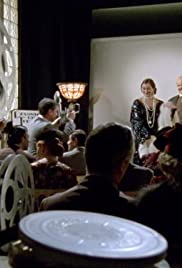
THE JEWEL ROBBERY AT THE GRAND METROPOLITAN
UK, 1993, 50 minutes, Colour.
David Suchet, Hugh Fraser, Philip Jackson, Pauline Moran, Trevor Cooper, Sorcha Cusack, Karl Johnson, Elizabeth Rider, Hermione Norris.
Directed by Ken Grieve.
This is one of the many short stories in the 70 episode series of television films of popular Agatha Christie stories with David Suchet as Poirot.
The story is as the title suggests. Poirot is in Brighton, ordered to have a holiday but wanting a case. He is introduced to the theatrical entrepreneur who has spoken to the press about the pearl necklace from czarist times which is being warned by his actress wife in the play which is about to to the United States. The necklace is stolen.
This is a locked room mystery. However, Poirot provides a neat explanation and the thieves turn out to be the entrepreneurs chauffeur and his wife, who is working at the May as a maid at the hotel and brings the entrepreneurs assistant her meal – with the box with the necklace locked and seen of an in close-up.
And the solution seems particularly logical!
1. The title? Accurate?
2. The popularity of Agatha Christie stories, mysteries, the television versions with David Suchet as Poirot?
3. This film as a short story, the running time, succinct, the crime, the suspects, the investigation?
4. The silent film footage, the story of the necklace? The entrepreneur, his play, his wife wearing the necklace, the speech to the media, promotion? The performances, the actress wearing the necklace, the story about its being stolen – and the later performances with the audience laughing at the references?
5. Poirot, the doctor, two weeks rest, his unwillingness, going to Brighton, Hastings with him? Joke about his being identified as Lucky Len from the newspapers? At the hotel, the mysterious stranger with the walking stick, walking up stairs? His room, comfort? The encounter with the entrepreneur, the invitation to see the play, the chauffeur taking him?
6. The jewel box, its being locked, pro and Hastings walking self-esteem to the theatre, the encounter with the playwright and the thugs because of his gambling? The relationship between the two? The playwright disgruntled about the entrepreneur altering the play? His loitering around the hotel? His being under suspicion?
7. The actress having the only key, the locked box, the force key in the hem of the dress of self-esteem? The maid, bringing the meal, self-esteem sewing, moving out of the room for scissors and thread? The locked doors? The discovery of the missing jewels? The entrepreneur and is upset?
8. The interrogations, Celestine under suspicion? The clue from Oscar Wilde? The name of the guest at the hotel?
9. The confrontation with the chauffeur, the truth, the revelation of how the robbery was achieved, Celestine’s absence, the maid and her speed in opening the box, the door, giving the necklace to Saunders?
10. At the theatre, the story about the jewels and whether they were authentic or not, Saunders coming to the theatre, his being caught?
11. At recovering not by having a holiday but by solving a case?
Published in Movie Reviews
Published in
Movie Reviews
Saturday, 09 October 2021 13:01
Agatha Christie's Poirot: Third Girl
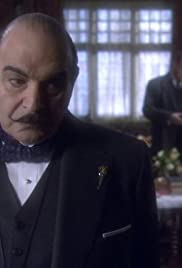
THIRD GIRL
UK, 2008, 93 minutes, Colour.
David Suchet, Zoe Wanamaker, David Yelland, Jemima Rupert, Matilda Sturridge, Tom Mison, Caroline O 'Neill, James Wilby, Peter Bowles.
Directed by Dan Reed.
Third Girl is one of the lesser novels of Agatha Christie, not even reviewed by some outlets on its release in the 1960s. However, it is a reminder that Agatha Christie’s mysteries have been very popular over many decades and the television series with David Suchet as Poirot also very popular.
The original setting with the 1960s but has been transferred back to the 1930s, the period for all the television series. The action is confined to London, a young woman, nervy, consulting Poirot and confessing to murder. In this story, Poirot has the help of his friend, the novelist, Ariadne Oliver, played by Zoe Wanamaker.
In many ways, this is not a solution of a murder but Poirot working to prevent a murder, the young woman, who lives in a flat with her two friends. But, she has an extensive back story, her mother’s suicide, her father’s abandonment of the family, his return from South Africa, another wealthy relative who is about to marry his younger assistant, a young man, a photographer, who seems to be something of a cad.
Poirot does his investigation, leading him to the headmistress of an exclusive school, her lying to him and a revelation her relationship with the husband who abandoned his family leading to a plot of greed and violence.
1. The popularity of Agatha Christie’s novels, mysteries, clues, solution? Series with David Suchet?
2. One of the least known of Agatha Christie’s novels, from the 1960s, the decision to go back to the 1930s, the setting of the others in the series?
3. The London settings, the apartment blocks, the streets, the atmosphere of the city? The musical score?
4. The focus on Norma, the background of her mother’s suicide, the disappearance of her father to South Africa, her affection, his abrupt departure, no contact? Her mother’s mental condition? Norma’s mental condition? Her boarding with the other two women, the third girl? The visit to Poirot, the confession of murder, disturbed, Poirot’s response?
5. The character of Ariadne Oliver, writing novels, her manner, discussions with Poirot, with the girl, going to the party, meeting David Baker, the other girls, the death of the nanny, her deciding to investigate further, confrontation, her being hit, hospital?
6. Norma and her situation, the return of her father, the family business, his assistant, being one of the girls and the flat? Her return to the family estate? Sir Roderick Horsefield, his relationship with Norma, the house, Sonja as his assistant?
7. The nanny, her murder?
8. David Baker, his charm, photographer, Frances posing for him, Norma’s attraction, his response to her? Ariadne Oliver’s visit? The truth?
9. Norma, the friendship of the two other girls, Claudia and her support, Frances and her continued care, going out of her way?
10. Poirot, the interviews, with Norma’s father, the empty office? With Sir Roderick? Getting the background? The portraits on the wall, the slashed portrait? The headmistress, the interview, her inconsistency with dates?
11. The threats to Norma? Her flashbacks to her mother?
12. Poirot devising the role play, Norma and the invitation of her mother’s death?
13. Poirot, assembling everyone, the revelations about the father, his death in South Africa, his friend taking his place, his callous attitude towards his daughter? Sir Roderick and marrying Sonia? The headmistress, her life, her relationship with Sir Andrew, Frances as her daughter, Frances and her scheming, hostility? Wanting Norma out of the way, the inheritance?
14. The complexities of the relationships, Poirot and the clues, the solution?
Published in Movie Reviews
Published in
Movie Reviews
Saturday, 09 October 2021 13:01
Agatha Christie's Poirot: Murder in Mesopotamia
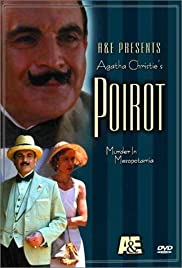
MURDER IN MESOPOTAMIA
UK, 2001, 103 minutes, Colour.
David Suchet, Hugh Fraser, Ron Berglas, Barbara Barnes, Dinah Stabb, Christopher Hunter.
Directed by Tom Clegg.
Agatha Christie spent several years on dig sites in the Middle East, her husband, Max Mallowen, being an archaeologist. This story takes advantage of her experience, archaeological digs in Iraq. The film was shot in Tunisia standing in well for Iraq.
While there is a lot of atmosphere, details of digs, archaeological finds, investigations, translations, there is also a murder. Hastings had been invited to come to the dig. Poirot was to meet a woman in Baghdad but she fails to turn up – leaving a final phone call for him to pay the hotel bill.
Most of the action takes place on the archaeological dig, with a genial Dr Leidner (Ron Berglas) directing. There are quite a number of associates, the wife of Dr Leidner and her nurse. She is the target – a rather far-fetched story about her first marriage, the death of her husband, subsequent threats. There is a subplot with one of the archaeologists heroine addicted.
There are quite a number of suspects, Poirot illustrating the possible guilt in the final meeting with them all – and a rather unexpected scenario for the murder of the wife.
1. The popularity of Agatha Christie’s novels? Her experience with her husband in archaeology? The television versions with David Suchet as Poirot?
2. The title, expectations? Archaeological digs in Iraq? The location photography, filmed in Tunisia, scenes in Baghdad, hotels, streets, the archaeological site and digs? The musical score?
3. The setting, Poirot in Baghdad to meet his friend, her never appearing, asking him to pay the bill? Hastings and his presence for two weeks of the dig? His nephew driving? Jovial? The discomforts of staying at the dig? Mosquitoes – and the mosquito catching sequence? Poirot impeccably dressed for the desert?
4. The background of the dig, Dr Leidner, his American background, long experience, genial personality? His love for his wife? Her presence at the dig? Attraction to Richard? The ambiguous looks, his friendship with Dr Leidner, the attraction to Louise despite himself? Miss Johnson, her devotion, her skills, older? Mercado, his work, his drug addiction, the initial encounter with the Arab, the murder? His wife and her devotion? The nurse and her presence, caring for Louise? Coleman, young and enthusiastic? The priest, his habit, his skills?
5. Louise, the welcome to Poirot, the dinner? Her fears, the face and the mask at the window? Her first marriage, the death of her husband, to marry again, threatening letters? The brother of her husband? The recurring letters, the gaps, the writing? Her death?
6. The local police, Maitland, his daughter and her wilfulness, riding out to the dig, her lies? The attraction to Richard?
7. The mysterious stranger, the priest working with the young boy, his skills and reputation? His leaving, the forgeries, the telegram that the real priest was at his monastery?
8. Mercado, going to the city, the room, his suicide and note?
9. Miss Johnson, the solution, her being murdered, the window?
10. Everybody assembled, Poirot and the indication of guilt for each one? The issue of the dead husband and the letters? Dr Leidner and
his alibi, on the roof? Miss Johnson working out what happened? The visualising, Dr Leidner as the former husband, 20 years later? Passion, inventions? His plot to kill his wife?
11. The far-fetched aspect of the plot? Yet Agatha Christie’s skill, and Poirot’s investigation and solution?
Published in Movie Reviews
Published in
Movie Reviews
Saturday, 09 October 2021 13:01
Polaroid

POLAROID
US/Norway, 2019, 85 minutes, Colour.
Kathryn Prescott, Tyler Young, Samantha Logan, Keenan Tracy, Priscilla Quintana, Javier Botet, Mitch Pileggi, Grace Zabriskie.
Directed by Lars Klevberg.
This feature film is based on a short film written and directed by Lars Klevberg. He was to go on to make the 2019 remake of Child’s Play.
The film is a variation on so many horror films, this time a mysterious camera, a specialty from the past, which has a violent history, is possessed by a strange entity who wreaks violence on anyone/everyone who is photographed by the camera.
There is a prologue with a young woman finding the camera, asking her friend to take a glamour photo of her, a mysterious shadow in the photo, the young woman then gruesomely killed.
The action then moves to another focus on a young student who is brought the camera as a gift by her boyfriend – his photo taken, his gruesome death. The main action focuses on a group of students, friends of the central young woman, a number of photos taken, a succession of grim deaths, and some researching into the origins of the camera. There is also a sheriff involved in the investigations.
The research is quite complex. It leads back to the camera being owned by a Professor who is alleged to have wrought vengeance on people who bullied his mentally disabled daughter. Eventually, the students interview his wife and find that the camera actually belonged to the daughter. It is also revealed that the father had sexually abused the daughter and was covering his crimes by his accusations – including accusations in the past against the sheriff as one of the attackers. And the sheriff is killed.
A lot of complications in interpersonal relationships with the group, fears, suspicions – and continued successions of death until the camera and the strange entity which appears for the killings, is exposed like film and burns, the camera thrown into the river.
A horror film designed for a younger audience.
Published in Movie Reviews
Published in
Movie Reviews
Saturday, 09 October 2021 13:01
Falcon Rising
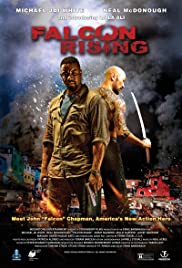
FALCON RISING
US, 2014, 103 minutes, Colour.
Michael Jai White, Neal Mc Donough, Jimmy Navarro, Millie Ruperto, Lateef Crowder, Lila Ali.
Directed by Ernie Barbarash.
Falcon Rising is one of the many popular action films from the United States, featuring martial arts champions in the central role – in the tradition of Stephen Segal, Jean- Claude van Damme…
Michael Jai White is a strong screen presence. He plays a Marine who has memories of shootings in Afghanistan, toys with Russian roulette and suicide. However, he receives news from his former colleague in Vietnam now working at the Rio Consulate, Neal Mc Donough. His sister has been severely bashed but is surviving in hospital.
There is often a presumption in American films that a tough agent can go to a foreign country and solve all the problems by himself. There is something of that in this film, especially since White is a martial arts champion and there are many opportunities for quite elaborate gymnastics and fights in the action of this film.
What initially seems to be the murder of an American aid worker in a favela, in the drug dealing culture, leads to a far more elaborate criminal system and the exploitation of young girls to be sent to Japan. The point is made about the many Japanese in Brazil and the presence of the yakuza exploiting the local drug dealers.
The screenplay is very earnest in its look at the social difficulties in Brazil, interspersing them with some brutal moments and some elaborate fights.
1. The title? John Chapman as Falcon? A story of an ex-Marine, PTSD, rising to challenge?
2. The American background? The Afghan background? The story in Rio? The favelas, fashionable society, poverty, child exploitation, violence, drug dealing? The American Consulate? The musical score?
3. Michael J.White as actor, as martial arts expert? His screen presence, desperation, the Russian roulette? Meeting his sister? His future and uncertainty? The call from Brazil? His immediate flight? Meeting with Manny, old comrades? His dramatic sequences? Earnest searching for his sister, sadness? And the insertion of the many fights and martial arts combat?
4. The situation in the favela, the dead woman on the rocks, the children, the bystanders, the young men, the arrival of the police, the role of Thiago and Carlo? Everybody pulling guns? Truce?
5. The removal of the body? In hospital, the severe wounds? The Asian nurse and the attempted killing? John and his vigil? The care of the doctors? Her convulsions and near death? Her recovery – and Manny’s hold over John, the American government paying the expenses if John becomes an agent?
6. John as the big tough American, coming into a foreign country, wanting to solve everything himself? The site for the body, his confrontation with the young man with his sister’s medal, the fight, the truth? The police officer and her explanation about the government, lack of financial support for the favelas, the drug money financing clinics and aid to the poor?
7. Following leads, his sister’s diary and the pages torn out, discovering the address of the club? His visit? The confrontation with the accountant in the toilet, his brutal treatment? The information about the resort, his visit? The confrontations, the fights, elaborate? The body count?
8. The information about the Japanese in Brazil? The influence of the yakuza, capitalising on the drug trade? The white slavery of the young girls?
9. The documents, faked, for the transport of the girls to Japan? The young man with the medal and his sister’s disappearance, friendship with John’s sister?
10. The climax, the fight at the resort, the Japanese with his sword? At the wharves? Shootouts?
11. Thiago and Carlo, the prayers the soldiers on mission, Thiago killing the young policeman, the betrayal? The final fights, Thiago and his confession, John and the gun, Thiago shooting himself?
12. The children saved? Manny and his hold over John to become an agent?
Published in Movie Reviews
Published in
Movie Reviews
Saturday, 09 October 2021 13:01
Agatha Christie's Poirot: Evil Under the Sun
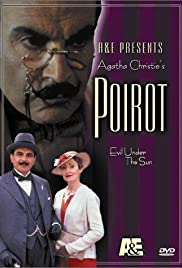
EVIL UNDER THE SUN
UK, 2001, 98 minutes, Colour.
David Suchet, Hugh Fraser, Philip Jackson, Pauline Moran, Michael Higgs, Tamsin Malleson, Louise Delamere, Carolyn Pickles, David Mallinson, Russell Tovey, Ian Thompson, David Timson.
Directed by Brian Farnham.
Agatha Christie’s novels have been extraordinarily popular. So have the 70 television versions of Poirot stories featuring David Suchet who has become Poirot in the popular imagination. This version of Evil Under the Sun is much more faithful to the literal detail and characters of the novel than the lavish in 1982 version with Peter Ustinov as Poirot and a star-studded supporting cast.
The film is set on a British resort island (where Agatha Christie actually wrote the novel) where Poirot has been ordered to go after a heart turn. He goes through the routines of the health resort, some people thinking he is there because of the murder but he has a sense of evil under the sun.
There is a murder, the wealthy flirtatious wife of an older serious husband. She flirts with the journalist, his wife, rather mousy, is on holidays with him. There is a variety of characters at the resort, a cycling older woman, a former vicar who is obsessed with loose women, denouncing them as Jezebels, a military man who turns out to be investigating heroin dealing, a boisterous man who loves sailing and, of course, is the heroin dealer. There is also the teenage son of the actress’s husband.
Plenty of suspects, and ingenious solution – which, is virtually the same as the solution in Death on the Nile.
1. The popularity of Agatha Christie novels? The television versions with David Suchet as Poirot?
2. The setting, the period, the island, the tractor transport to the island, the lavish building, health spa, the cliffs, the beaches, the caves? The musical score?
3. Poirot, Hastings’ Argentinian restaurant, with Miss Lemmon, his collapse? His being sent to the island? The meagre meals, no alcohol, the sweating machine…? People thinking that he was there because of the murder? His sense of evil?
4. Patrick Redfern, journalist, flirting with the actress, his quiet wife? The wife and her sketching, taking Lionel with her, his going swimming? The background of the vicar, the initial murder in the woods, his sermons against Jezebeis? Horace Blatt, in the sweat box, the discussions about sailing? Miss Brewster and her cycling? The other members at the resort? The major and his interventions? Mrs Castle and her running of the hotel?
5. The cave, the two birdwatchers without binoculars, their return, the heroin box, pulling guns, arrested? The major and his surveillance of the heroin smuggling?
6. Miss Brewster, the bottle thrown out the window, Redfern asking her to go with him, the discovery of the body on the beach?
7. Hastings and Poirot, their friendship, the investigations? The arrival of Inspector Japp?
8. The interrogations? Clues? Gathering everyone together? The re-enactment of what happened, Lionel, his book, the librarian, Christine’s invitation, altering his watch, taking his glasses and planting them? The timing, Christine and the tan, the bottle, lying as the body, rushing up the ladder, the killing of the actress, her body on the beach?
9. The similarity of this plot to that in Death on the Nile?
Published in Movie Reviews
Published in
Movie Reviews
Saturday, 09 October 2021 13:01
Agatha Christie's Poirot: Lord Edgeware Dies
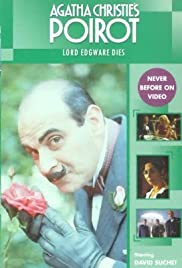
LORD EDGWARE DIES
UK, 2000, 99 minutes, Colour.
David Suchet, Hugh Fraser, Philip Jackson, Pauline Moran, Helen Grace, John Castle, Fiona Allen, Dominic Guard, Deborah Cornelius, Tim Steed, Christopher Guard, Ian Fraser.
Directed by Brian Farnham.
Lord Edgware Dies is a popular Agatha Christie novel. It was filmed in 1985 as Thirteen at Dinner with Peter Ustinov and Faye Dunaway in the central roles – and David Suchet himself as Inspector Javert.
This is an atmospheric recreation of the murder of Lord Edgware, the atmosphere of the world of the theatre, acting, impersonations. Helen Grace is quite glamorous as the actress who is the main suspect for the murder but who has an alibi – an ingenious plot where another actress, skilled in impersonations, takes her place at the dinner.
Captain Hastings appears in many of the stories, friend of Poirot, helping in the investigations. He is played by Hugh Fraser. Philip Jackson also appears, as he does in many of the other versions of Agatha Christie mysteries, as Inspector Japp.
1. The popularity of Agatha Christie mysteries? The television series with David Suchet as Poirot?
2. Comparisons with the previous version, 13 at Dinner (with Suchet appearing as Inspector Japp)?
3. The title, blunt, Lord Edgware and his behaviour at the theatre, slow clapping his wife, humiliating her, his talk about being humiliated, refusing the divorce? Poirot questioning him, his sending the letter to his wife? His plans to go to Paris for business? His death?
4. The theatre atmosphere, Jane and her stage performance, humiliated by her husband, asking for the divorce? The party after the cabaret performance? Poirot present, with Hastings? Carlotta’s impersonation of Poirot? The variety of guests, Bryan Martin and a previous relationship with Jane? Penny Driver and her resentments towards Jane? Lord Edgware’s nephew, producer, lacking money? Bryan going to Poirot asking him to take a case?
5. Jane, her charm, asking for Poirot’s help with her husband? Denying she had received the divorce letter? Her relationship with the Duke of Merton? Her presence at the dinner, number 13, the phone call?
6. Hastings, the failure of his investment in Argentina, his wife still there, reunion with Poirot, with Inspector Japp? With Miss Lemmon?
7. The murder, Miss Carroll and her witness, her devotion to Lord Edgware, his rejection of her? Alton, a month in service, his witness? Being interviewed by the Inspector, Poirot and Hastings? The certainty that it was Jane arriving at the house?
8. The variety of suspects, the nephew and his need for money, Lord Edgware’s daughter and her dislike, Brian Ross and his writing the play, Penny and Bryan and their liaison? Miss Carroll? Alton and the robbery, going to Argentina, getting on the plane, his flight, falling to his death?
9. Hastings and his clue about the different order of events? The letter from Carlotta to her sister? The mystery about the nephew and the $2000?
10. Poirot, the comments on his infatuation with Jane? His gathering everyone together, the explanation of the mystery, Carlotta taking Jane’s place at the dinner, Jane and the murder, her altering the letter to Carlotta’s sister? Her brazen response when exposed?
11. Satisfactory mystery, clues, solution?
Published in Movie Reviews
Published in
Movie Reviews
Saturday, 09 October 2021 13:01
Agatha Christie's Poirot: Death on the Nile
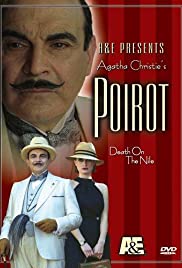
DEATH ON THE NILE
UK, 2004, 97 minutes, Colour.
David Suchet, James Fox, Emma Malin, JJ Feild, Emily Blunt, Judy Parfitt, Daisy Donovan, Barbara Flynn, Daniel Lapaine, David Soul, Frances de la Tour, Zoe Telford, Alistair MacKenzie?, Steve Pemberton.
Directed by Andy Wilson,
Death on the Nile is one of Agatha Christie’s most popular novels. This was enhanced by the lavish production of 1978 and its star-studied cast and Egyptian locations.
This film is part of the series of 70 films of Agatha Christie stories featuring David Suchet as Poirot. In most people’s imagination, Poirot is David Suchet. This film boasts Egyptian locations, a recreation of the 1930s style, the cruise on the Nile.
There is a wide range of characters, also a range of interesting performances. And a strong performance in an early role by Emily Blunt, the murder victim, an arrogant target. The plot, as always, is ingenious (although it resembles strongly the murder and solution in Evil under the Sun).
1. The popularity of the novel? Of Agatha Christie’s mysteries? Of the David Suchet series?
2. The lavish 1978 version? Comparisons?
3. The locations, Egypt, the Nile, the ancient monuments? The lavish style on the cruise? Costumes and decor, period? The musical score?
4. The introduction to Jacqueline and Simon? Love, the financial situation? The introduction to Linnet, her wealth, her arrogance? Simon’s introduction?
5. Egypt, the breaking of the engagement, Simon and Linnet? Jacqueline ever present and pursuing them? Her dramatics, explanation to Poirot?
6. The variety of personalities on the cruise, Rosalie Otterbourne, her novels, dramatic attitude, dancing with one, flirting? Her daughter and severe presence? Miss Van Schuyler, her snobbery, Cornelia as her companion, timid? Mrs Allerton, her son and his devotion to her? Ferguson, his communist sympathies from the University, his harsh comments? Mr Pennington, American, business interests? The interactions, comic, serious?
7. The accident and Linnet almost killed? Later proven to be an accident? Mr Pennington and the golf club?
8. Simon, Jacqueline and her dramatics, shooting his leg, the doctor attending, confined to bed? The revelation that Linnet was dead? The blood on the wall? The gunshot and the missing shawl? The bundle thrown into the water – and recovered?
9. The mystery, the death of the maid? Miss Otterbourne being shot?
10. The issue of the stolen pearls, the substitution, Allerton and his being unmasked?
11. Everyone gathered, the explanation of what it happened, the flashbacks, the expert planning of Simon and Jacqueline? Simon carried out, Jacqueline and the kiss and shooting him, her being shot?
12. Cornelia, her role in the alibi minding Jacqueline? Ferguson and his attentions, proposal? Miss Van Schuyler changing attitude when he was a lord? But Cornelia marrying the doctor?
13. Poirot, his style, the arrival of Colonel Race, his participation in the investigation?
Published in Movie Reviews
Published in
Movie Reviews
Saturday, 09 October 2021 13:01
Invisible Guardian, The/ El Guardian Invisible
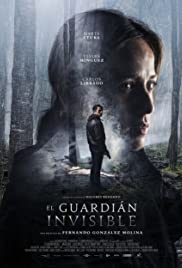
THE INVISIBLE GUARDIAN/ EL GUARDIAN INVISIBLE
Spain, 2017, 129 minutes, Colour.
Marta Etura, Elvira Minguez, Nene.
Directed by Fernando Gonzalez Molina.
The Invisible Guardian refers to a mythological forest protector in northern Spain.
This is a police detective investigation, a series of serial killings of young women, naked, posed with hands like a statue of the Virgin Mary, a particular cake placed on their bodies. The local police investigate but a detective, who grew up in the town, has left the town and worked with the FBI in the United States, now returns and pursues the investigation.
The investigation is interesting in itself, following the clues, discovering connections, going back many years and further victims. The investigation is complicated by the mythologies of the area, communicated to the detective by her aunt who brought her up after she had suffered sadistic torments from her mentally unbalanced mother. Her two sisters are also in the town, the older who runs the bakery inherited from their father, and seems to resent the young woman. The detective is criticised by various people in the town.
The screenplay also focuses on the detective’s past, showing Her Is a little girl, her treatment by her mother, the support of her father, going to live with her aunt, her leaving the town and not wanting to return.
The film has very solemn atmosphere, many scenes of mist, clouds, rain, rivers and waterfalls.
Eventually, the mystery is linked with her family’s very conservative and judgemental attitudes, condemning young women for their behaviour – and one of the family then responsible for the murders.
The film was successful – and there were two sequels.
1. Crime and investigation? Serial killer? Motivation for the murders? The target victims? In the context of the town? In the context of family?
2. The setting, northern Spain, the town, the streets, homes, church, the countryside? The seasons? The rain and mist? Atmospheric? The musical score?
3. The title, the mythology, the protective creature? The aunt and her superstitions and her knowledge? The influence on Amaia?
4. The background of Amaia, the cruelty of her mother and its influence, her support of father, the bakery, her older sister and her resentment, the middle sister? The sisters and their husbands? Amaia going to the United States, working for the FBI? Her age,
experience, her detective instincts? (And the phone calls to her mental in the United States and his advice, his support?)
5. The discovery of the murdered girls, the buildup of the list of girls murdered? Sexual overtones? Yet their hands like the statue of the Virgin Mary? Strangled?
6. Amaia, her role in the investigation, Jonan as her assistant and his following leads, the superior and his absences? His return? Tensions between the two?
7. Amaia and her style of investigation, on the spot, autopsies, evidence?
8. The discussions with family, the background of the victims, some mixing and socialising, others more reserved?
9. The lack of suspects? The connections with the girls? The angry father, the mother, the dead girl, as part of the series or not?
10. Amaia, in herself, her age, her relationship with the artist, his support of her, the meals with the family? Her wandering by herself, the mist in the rain, by the river? The visit to the church and the religious overtones?
11. The antagonism with her sister, the bakery, the memories of the past?
12. The sisters and their husbands, their characters, at meals, with Amaia?
13. The danger to Amaia, the brother-in-law, the confrontation, the violence? His being the murderer, the historical background, the religious motivation, moral condemnations, his marriage to Flora, the absence of killings after the marriage, the new crisis, the victims?
14. Flora, her understanding of her husband, the symbolism of the special cakes and their being placed on the bodies, the examination of the flower, from Flora’s bakery? Flora waiting for her sister to solve the case?
15. The film adaptation of the detective novel – and sequels following?
Published in Movie Reviews
Published in
Movie Reviews
Saturday, 09 October 2021 13:01
Agatha Christie's Poirot: Five Little Pigs
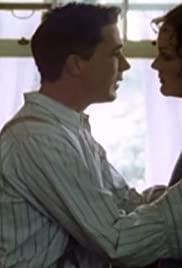
FIVE LITTLE PIGS
UK, 2003, 93 minutes, Colour.
David Suchet, Rachael Stirling, Aidan Gillen, Toby Stephens, Marc Warren, Amy Mullins, Julie Cox, Gemma Jones, Sophie Winkleman, Tallulah Riley, Patrick Malahide, Annette Badland.
Directed by Paul Unwin.
Five Little Pigs seems an ungainly title for an Agatha Christie thriller. However, it was a popular novel by the author and filmed in the series of television versions with David Suchet as Poirot, embodying him with all his characteristics and tics.
This plot differs insofar as the action takes place 14 years after the execution of a woman for poisoning her husband. The young daughter, whom the audience had seen in flashbacks, returns from Canada and enlists the aid of Poirot to find out what really happened.
Which means that the action is basically five interviews with those who were present at the time of the death. The dead man was an artist, played by Aidan Gillen, married to a strong minded woman, Caroline, played by Rachael Stirling. Toby Stephens plays the dead man’s best friend (and some commentators quibbling about whether Agatha Christie intended him to have a gay attraction), Marc Warren as his brother, a scientist with a laboratory where poison could be found. Gemma Jones is the chaperone. Julie Cox is the provocative young woman who is portrayed as being painted but who wants the artist for herself. And Sophie Winkelmann is the dead woman’s sister, growing up in the family, her suffering an eye injury because of an episode with her older sister.
Then Poirot gathers the five witnesses together, letters from the hanged woman seeming to indicate that her sister had committed the murder. However, Poirot discovers the inconsistencies in the narrative and, of course, it is someone else who committed the murder.
1. The popularity of Agatha Christie’s novels? Film and television versions? David Suchet embodying Poirot?
2. The title, the references? The five different stories?
3. Country setting, the house, the environment? The musical score?
4. Poirot dining, meeting with Lucy, her asking his help? The flashbacks, Lucy as a little girl, with Angela, with her mother and father, the posing for the photo? The flashback to prison, Caroline and her writing the letter, her going to the Gallows?
5. Poirot and his contacting the five witnesses? The conversations, the interrogation? The flashbacks, to childhood, to the situation of
the murder?
6. Philip Blake, childhood friend, the revelation of his attraction to Amyas? The role of Caroline? His interpretation of her as a character, behaviour? Amyas his best friend? The visit, experiencing the tensions, his attitude towards Elsa? His brother, the laboratory, overhearing the couple and misinterpreting? His upset with Poirot, then giving him the interview?
7. Meredith, Philip as his brother, the past, his investigations, laboratory, the tour, the poisons and his explanation, the missing bottle? His presence at the house? Later expression of his infatuation for Elsa?
8. Elsa, her later marriage? Aged 18, determined to marry Amyas, arranging the portrait, going to the house, living in, her assertiveness, defiance? Amyas and his response? Caroline and her suspicions? Elsa and her declaration about marrying Amyas, moving into the house, changing it? Her reaction to his death? The interview with Poirot, her being calm, not emotional?
9. Miss Williams, her place in the household, her devotion to Caroline, not believing her guilty? Her description of the events, observing, the information about Caroline wiping the beer bottle for fingerprints?
10. Angela, her lecture, the discussion with Poirot, the past and the injury to her eye from Caroline’s anger? Her place in the house? Not wanting to go to board? Her dislike of Elsa? Her being the main suspect? Caroline believing her to be guilty, the letter from Caroline, her execution being repayment for injuring the eye, urging her to be free?
11. The group gathered together, Elsa coming from the city? The reactions, Angela seeming to be the guilty person? Poirot listening to the interrogations, the different interpretations, the re-enactment of the reality? Elsa and her guilt? Her final self-possession?
12. The plot, the device of Poirot investing a crime of the past, interrogating the witnesses? Exonerating Caroline?
Published in Movie Reviews
Published in
Movie Reviews